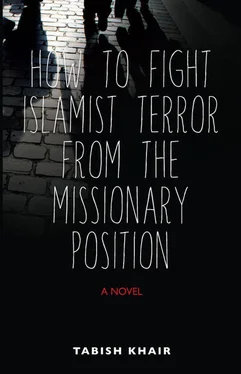When we returned that evening, I realized that Karim’s arrest had distracted Ravi—permanently, I hoped, and said as much to Ms. Marx—from the mantra of his mobile. I don’t think he could ever forget Lena, but now he had something else to think about too. He had spent most of the day calling up people who knew us—and Karim. He had even tried to get in touch with Ali, but Ali had not been available. He had called Ajsa, but she was too busy with her own domestic tragedy to have visited Karim in detention. Only Great Claus, it appeared, had visited Karim, who had asked for—and received—his prayer beads in his cell. It appeared that Great Claus and some other people who knew Karim had also spoken to the police.
“It’s all a misunderstanding, Great Claus told me,” Ravi said to us that evening. “Great Claus says it will become clear soon enough.”
I smiled, disbelievingly. I did not want to contradict Ravi, if Great Claus’s naïveté made him feel better. Instead, I asked him how Karim had taken to Great Claus’s visit; after all, he had avoided the two Clauses ever since they disclosed their homosexuality.
“What do you expect!” Ravi laughed, and I must say it was good to see him laugh again. “Great Claus could not help chuckling over it on the phone. Karim Bhai was touched, he said, but he basically asked Great Claus about his family, his daughters, his job, everything one could possibly think of except Little Claus. As if Great Claus was still living with his family.”
Ravi chuckled.
I did not find it funny. I wondered how someone of Ravi’s acute intelligence could not draw the obvious inference about Karim’s guilt from such, to all eyes, clear proofs of prejudice and narrowness.
The very next day, we read in the papers that Karim Bhai had been released. Ms. Marx woke us up with the news before she drove her son to school that morning. She had glanced at the paper, as she always did, while making breakfast for her son. She was as surprised as I was.
I could not possibly drive off without telling you, she said, as we scrambled, bleary-eyed, for the front pages.
Even Ravi could not have been hoping for something so dramatic. Not satisfied with Ms. Marx’s daily Politiken , he ran off in his pajamas, pulling on a thin jacket and a pair of boots without bothering to put his socks on, and returned in ten minutes—he must have run fast—with all the newspapers and tabloids that he could buy from a neighboring bakery. “Bastard,” he cried out, when he saw me again. “What did I say!” He was shivering from the cold, but did not notice it.
Karim had not just been released on bail. It was more dramatic than that. All charges against him had been dropped. There was a photo of him—his back, actually—in one of the tabloids, trying to enter unobtrusively the building in which we had shared a flat with him for a year.
The rest you probably know. Karim Bhai was released after three days in detention; a week later, the police announced that he was not implicated in the “Islamist Axe Plot.” The tabloids reported it with barely concealed suspicion. A politician from the Danish People’s Party ranted about how weak Danish legislation was, how it allowed terrorists to walk away scot-free. Anti-Muslim online sites such as Uriahposten foamed in cyberspace.
But the facts were clear: They had nothing to do with Al Qaeda; they had to do with a Danish woman. Karim had met her in Cairo. She was twenty-three years older than him. They had gotten married.
Seven or eight years ago, when she took early pension, his wife had asked for a divorce. Nothing was wrong between them. I hesitate to say that they were in love, for I wonder whether that much-sullied term holds the same meaning for everyone. But it appears that whatever they had shared in Cairo was still intact.
But Karim’s wife had gotten older; perhaps she had another fear at the back of her mind, and wished to release Karim from a burden that she suspected was about to fall on her shoulders. In any case, she felt too old to continue to be in a relationship with a much younger man, a man with other expectations and needs than her. That is what she told him and their mutual friends. She wanted to retire to the countryside, while Karim—she knew—not only needed to be in a city for his work but also, like most colored immigrants in Denmark, felt comfortable only in urban settings.
Karim had differed but he had accepted her decision. They had divorced within a year. He had stayed in touch with her, visiting her regularly as, over the next year or two, it became obvious that she was succumbing to Alzheimer’s. When she could not continue to live on her own, Karim Bhai admitted her to the best care he could afford. He went beyond what was freely available under the fraying Danish health-care system, which was being merrily liberalized by successive governments.
Over the years, she had drifted into her own world. Karim Bhai still visited her regularly. In periods when she recovered some lucidity, she would call him, and he would take a day or two off and check into a motel next to her. Those were the phone calls that had increased our suspicion of Karim. Her lucid periods never lasted for more than a day or two. That is when he used to disappear, mysteriously. That is why he would come back looking morose and tired—what Ravi and I, in our final moments of suspicion, read as anger or bitterness. That is why he needed to rent out his flat, work the extra hours.
Of course, the tabloids did not report it in such detail. We heard most of it from the Clauses. As I wrote earlier, we had moved out of the flat—storing most of our stuff in Boxit—the day after we informed on Karim Bhai. We stayed a few days with different friends: three nights at Ms. Marx’s, a couple of nights at the Clauses, whose newly conjoined bliss had been dented but not destroyed by the controversy around Karim, a few more nights in other places. Then I found another flat to rent. Ravi had only a few days left in Denmark. He decided to spend them traveling around; when he stayed over in my flat, he slept on a mattress on the floor. We never went back to Karim Bhai’s place. It seemed pointless.
But we spoke to common friends and we read the tabloids and papers. The Clauses, in particular, kept Ravi posted.
The papers reported the facts that common friends verified. But the reported facts were stained by incomprehension and suspicion. How could the Danish media really comprehend a man like Karim when we, Ravi and I, had failed to do so? The tabloids sneered subtly at his older-by-more-than-twenty-years wife, insinuating that he must have married her to get into Denmark. But I thought otherwise. I recalled Karim Bhai explaining to Ravi just some months back: “The Prophet, peace be upon him, had only one wife: she was about twenty years older than him. He remained faithful to her and he did not marry again until after she died, peace be upon her.”
Why is it that Karim never mentioned to us that he still called on and took care of his ex-wife? It turned out that Great Claus and Pernille had known of her but they were also aware of Karim’s strong reluctance to talk about it. So had some other people, but then they did not move in our circles.
Karim had never mentioned staying in touch with his ex-wife—let alone her illness—within our hearing. He had never told anyone who did not already know that he took care of her. He had not even mentioned her existence. Why?
I can give so many answers. Was he embarrassed by her illness, her condition? Or did he feel that silence was owed to the last shreds of dignity to which she still clung in moments of clarity? Did he feel that, being a good Muslim by his own lights, he could not—as my parents would put it—let his left hand know the good that his right hand did? Or was it because—being so narrowly religious—he felt that he was doing something reprehensible and un-Islamic: visiting and spending days alone with a woman who was no longer his wife?
Читать дальше












